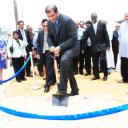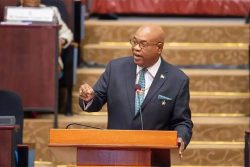President Bharrat Jagdeo called for a more energetic financial sector, yesterday stating that this was critical to economic growth and capital accumulation in the country.
 He made the call while addressing those gathered opposite the Canadian Embassy for the turning of the sod ceremony to mark the commencement of construction for the new $2.6 billion Guyana Bank for Trade and Industry (GBTI) head office.
He made the call while addressing those gathered opposite the Canadian Embassy for the turning of the sod ceremony to mark the commencement of construction for the new $2.6 billion Guyana Bank for Trade and Industry (GBTI) head office.
Prior to yesterday’s event, the first phase, which involved land filling and pile driving to accommodate the foundation of the main building and the services buildings, was completed.
The new head office, which is expected to be completed by next November, would be a modern four-storey structure of impeccable design encompassing a total floor area of about 54,000 square feet.
The President in his feature address, while congratulating GBTI, expressed hope that it would not just become another beautiful building in the city, which would be used for better planning and gains for the institution, but would also give impetus for innovation in the financial sector.
Jagdeo emphasised the importance of a financial system and noted how problems in this sector could impact greatly on a country and the world. He noted that the financial sector was key in driving economic growth, adding, “What we see today is a deepening financial sector which promotes economic growth and capital accumulation in the country. This is absolutely what is needed if we are to reach and achieve our full potential.”
Stressing on Guyana’s healthy financial system, the President said there was need for an increase in dialogue between the public and private sectors to better serve the people and economy.
He said financial problems impact on a country in different ways depending on the integration, citing economic problems in several countries such as Mexico, Korea, South East Asia, Russia and Brazil, which caused major disruptions in the world. He said these were evidence of the direct link between the financial sector and people’s well-being.
Jagdeo stressed that energy from the financial sector needed to be seen and not just from GBTI. Further, he said, Guyana has been able to build capacity over the years but he predicted that with the changing global financial patterns, there would be major challenges in the future.
He said there needed to be new approaches to managing global finances and as such, institutions have to change their approaches to problems.
The President stressed the need for bodies such as the World Trade Organisation to tackle some of the issues that the financial sector is facing, taking into account the global problems.
He also spoke about climate change and the rising food prices. Referring to Guyana, he noted that climate change was having a great impact on the agriculture sector. In that light, he called on the private companies to get on board and assist in whatever way they could.
GBTI’s CEO Radhakrishna Sharma said the idea of the establishment of the head office came in early 2004 and this reflected a forward-looking approach to being a strong financial player in the country’s growing economy.
He told the employees, government officials and members of the diplomatic community who were gathered for the simple ceremony that in 2005 there was a successful bid to purchase the land and after comprehensive planning, steps were taken towards making the bank’s goal a reality.
He said the project comes at an appropriate time in terms of the country’s future prospects and needs. Sharma stressed that when one looked around today, one could see signs of optimism for the future in the new investments in infrastructure and facilities. Projects such as the Berbice and Takutu bridges, the Skeldon Sugar Factory Modernisation Project and other business developments and expansions, he said, all flowed from the confidence and perseverance of Guyanese in wanting to see the country develop.
He said a pragmatic view of development needed to be adopted with a focus on future opportunities to facilitate change and dramatic economic growth rather than structural impediments and other perceived barriers and challenges.
However, the CEO also noted the critical challenges that needed to be addressed such as national security, climate change, and food security, among others. But he said it was up to all stakeholders to deal with these issues and provide a base from which growth and development could take off.
“GBTI is conscious that the future carries new and different challenges, thus we have adopted this head office strategy to be in a position to better address the financial and other business needs of local industry and maintain the bank’s leadership and achievements in the local financial sector,” Sharma said. He said the new office would open a chapter in the bank’s progress, representing a further step toward strengthening the client relationship. He also reaffirmed a commitment to provide quality products and services.








